Will Israel Hamas conflict lead to World War 3?
The authoritarian axis of Russia, China and Iran has been challenging world order in Israel after Ukraine, as experts reveal their fears for what may happen next.
World
Don't miss out on the headlines from World. Followed categories will be added to My News.
While Joe Biden was in Israel this week, scrambling to prevent all-out war in the Middle East, Vladimir Putin and Xi Jinping were happily greeting each other as dear friends in Beijing.
The split-screen neatly encapsulated what is generally considered the most perilous geopolitical moment since World War II.
The US is a waning superpower battling to preserve peace on multiple fronts; Russia and China are strengthening their “no limits” partnership; Iran, not pictured, is emerging from the shadows to extend that authoritarian axis.
Eminent historian Niall Ferguson, from Stanford’s Hoover Institution, fears “we may be re-running the 1930s”.
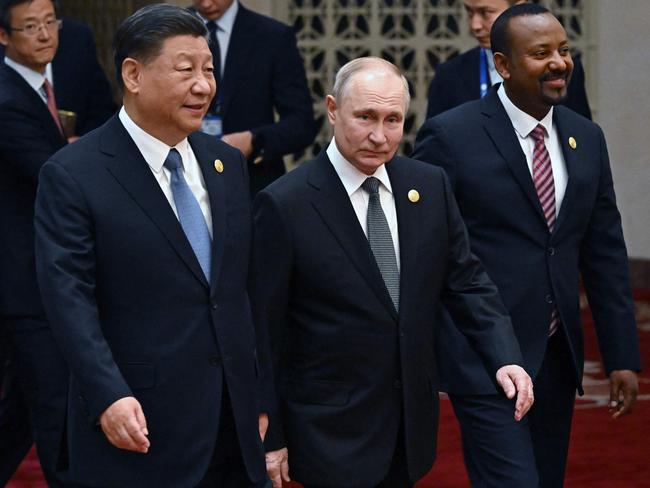
Hamas’s horrific attack on Israel, by his way of thinking, could be the tipping point in a cascading series of conflicts that ends in a Third World War.
The US President, who grew up in the 1940s, promises America can support Israel as well as Ukraine in its war against Russia, and “still maintain our overall international defence”.
“We’re the United States of America for God’s sake, the most powerful nation … in the history of the world,” Biden said prior to his unprecedented wartime trip to Tel Aviv.
His counterparts in China and Russia, however, are determined to end US hegemony and build what Putin calls a “fairer, multipolar world and system of international relations”.
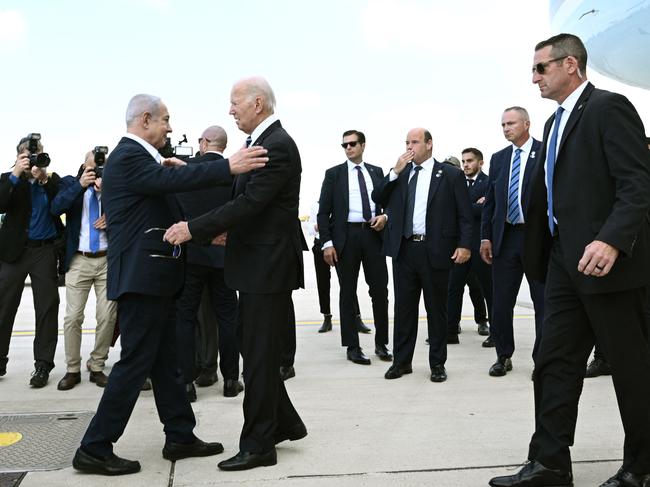
Russia’s invasion of Ukraine was the first test of these starkly different visions.
The US and Europe have been steadfast in supporting Ukraine – some domestic differences notwithstanding – and have provided billions of dollars in military support.
Russia, meanwhile, is receiving arms from Iran and North Korea and diplomatic cover from China
Hamas’s invasion of Israel has become the second test. Russia and China, in refusing to condemn the terrorists for murdering 1400 civilians, have made their position clear.
Hudson Institute senior fellow John Lee, who was the senior national security adviser to former Australian foreign minister Julie Bishop, said this has accelerated “the separation of geopolitics into two camps” – America and its allies versus the authoritarian axis.
What happens next in Israel is more complicated than Ukraine.
Iran is the puppet master behind not only Hamas in Gaza, but Hezbollah in Lebanon and armed groups in Syria, Iraq and Yemen. The harder Israel goes after Hamas, the higher the chance that Iran hits back via its proxy forces or even directly, widening the war and forcing the US to intervene.
“Virtually all the major parties involved probably don’t want it to escalate into a wider regional confrontation but have adopted positions that, if they remain unchanged, virtually guarantee that it does,” the Carnegie Middle East Center’s Michael Young said.
This may not appeal to Russia, which has a military presence in the region but could lack the capacity to fight beyond Ukraine. Lee suggests China will also be “very nervous”.
“China wants to dominate the global order rather than destroy it. But its allies such as Russia and Iran are behaving as wreckers of the global system,” he said.
“This will become an increasingly diabolical dilemma for China.”
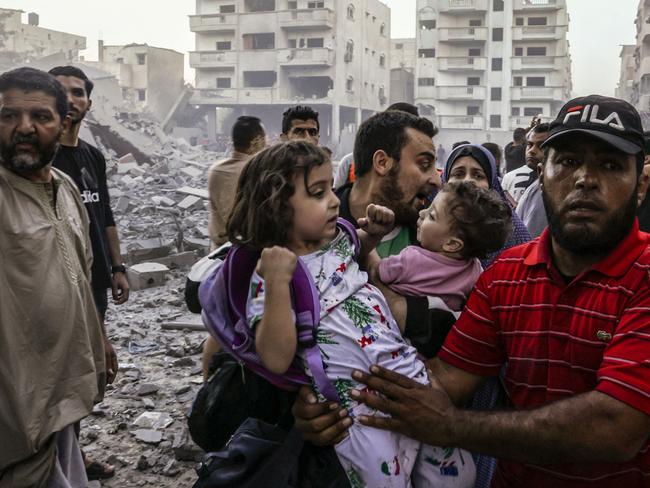
Regardless of how the war unfolds, Lee points out that “the most strategically significant consequence” is that Biden’s efforts to broker a normalisation of ties between Saudi Arabia and Israel have stalled, preventing a breakthrough that could have “fundamentally changed the Arab-Israeli dispute into one only with Iran and its proxies”.
Indeed, a week before Hamas’s assault, US National Security Adviser Jake Sullivan had triumphantly proclaimed: “The Middle East region is quieter today than it has been in two decades.”
If Israel is embroiled in a lengthy conflict, analysts also question whether the US has the capacity to supply enough munitions on top of its obligations to Ukraine.
Earlier this year, Center for Strategic and International Studies senior vice president Seth Jones warned the war in Ukraine had “exposed serious deficiencies in the US defence industrial base” which undermined its deterrence posture and would make it “extremely difficult for the US to sustain a protracted conflict”.
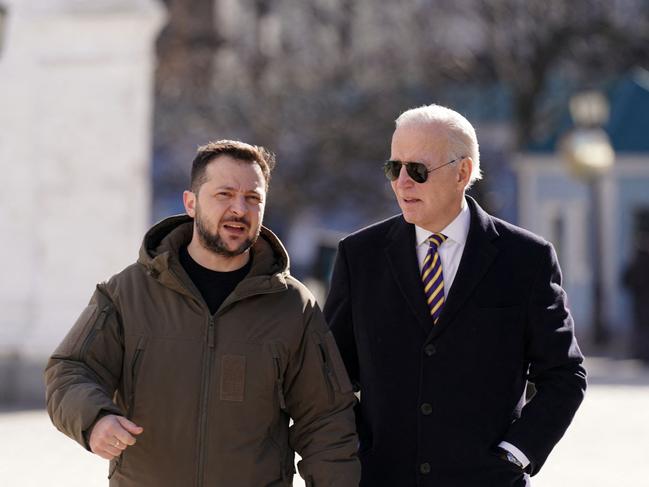
Jones was writing in the context of what may be the third and most dangerous test of the competing visions of the world order – China’s intent to retake Taiwan, by force if necessary.
Kathryn Paik, who was until recently the US National Security Council’s Southeast Asia and Pacific director, believes the Biden administration can sustain its enhanced focus on the Indo-Pacific region amid the conflict in Ukraine and Israel.
She points to the President’s soft power moves, including summits with Pacific leaders and a bolstered diplomatic presence.
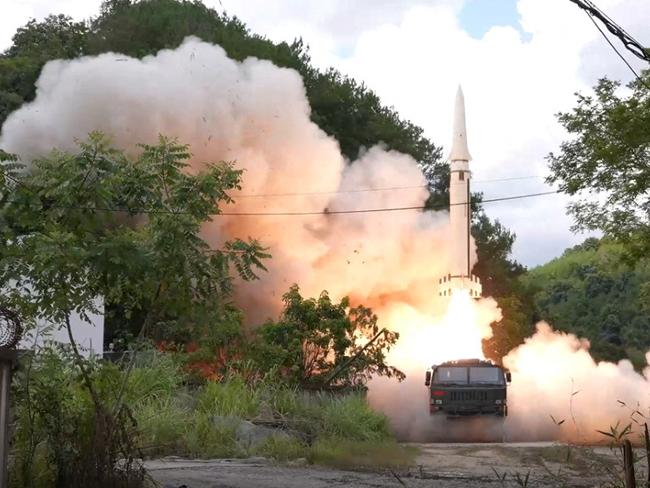
The hard power question is more fraught. Jones predicts the US would run out of long-range precision-guided munitions in less than a week of fighting over Taiwan, leaving American forces no match for a Chinese military that is acquiring weapons systems six times faster.
All of this was front of mind this week for Australia’s Deputy Prime Minister Richard Marles, who was speaking in South Korea while Biden was in Israel and Putin and Xi were in Beijing.
“The most consequential risk we face is the resumption of great power conflict in our lifetime,” Marles said, repeating a warning he had issued previously, only to expand it by offering perhaps his government’s most pointed statement on Taiwan.
“The consequences of US-China conflict over Taiwan are so grave that we cannot be passive bystanders,” Marles declared.
So if Ferguson the historian is right, and the world is spiralling towards war, then Australia will be in the thick of it.
Originally published as Will Israel Hamas conflict lead to World War 3?
Read related topics:Joe Biden





